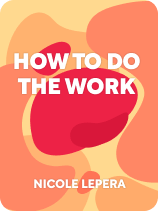

This article is an excerpt from the Shortform book guide to "How to Do the Work" by Nicole LePera. Shortform has the world's best summaries and analyses of books you should be reading.
Like this article? Sign up for a free trial here.
Why do you have subconscious thoughts? What is their role in your behavior?
Psychologist and bestselling author Nicole LePera studied the brain to find the link to subconscious thoughts, behaviors, and beliefs. According to LePera, we should be more aware of how childhood conditioning impacts mental and physical health through the subconscious.
Keep reading to find out why you have subconscious thoughts, according to LePera.
The Role of Your Subconscious Thoughts
Your subconscious creates default patterns, and your brain relies on these patterns to keep you safe. LePera argues that the primary role of your subconscious thoughts is to keep you mentally and physically safe. This is achieved by your brain scanning the environment for threats to protect you from.
(Shortform note: Neil Pasricha (The Happiness Equation) explains that your subconscious mind’s perpetual vigilance is a result of evolution. To ensure survival, your ancestors had to constantly stay alert to danger and think about food and shelter. Letting their guard down made them vulnerable to predators and competitors. Though you don’t face the same risks now, your instinct to avoid danger hasn’t evolved.)
How does your subconscious mind know how to recognize a threat? LePera explains that it learned this from your childhood emotions. According to her, your subconscious records thoughts and stores your every experience. This means that it remembers every single thing that’s ever happened to you, including experiences you’ve consciously forgotten. It then uses the information it stores to create your default patterns. Further, as well as recording all your experiences, it also categorizes the emotions you felt during these experiences—it does this so that it can predict what types of situations might pose a threat.
If you felt positive thoughts during an experience, your subconscious mind categorized that type of experience as safe. If you felt negative emotions during an experience, your subconscious mind categorized that type of experience as a threat. According to LePera, it now uses this information to interpret and categorize threats in your environment. And, each time it perceives a threat, it influences you to automatically engage in your defensive behaviors.
For example, you were bitten by a dog when you were a child. The experience terrified you. By default, your subconscious thoughts now interpret dogs in your environment as possible threats and influence you to feel fear and flee.
(Shortform note: In Awaken the Giant Within, Tony Robbins expands on how your subconscious mind thinks by identifying threats, arguing that it relies upon neuro-associations—the way your brain links certain experiences with pain and others with pleasure—to categorize your experiences. According to him, your brain relies on these neuro-associations to direct your behavior toward feeling pleasure (safety) and away from feeling pain (threats), and you have to reprogram these associations to create new default patterns. For example, programming your mind to associate dogs with pleasurable thoughts convinces your subconscious mind that dogs are safe and helps you overcome your automatic fear response.)

———End of Preview———
Like what you just read? Read the rest of the world's best book summary and analysis of Nicole LePera's "How to Do the Work" at Shortform.
Here's what you'll find in our full How to Do the Work summary:
- How childhood conditioning impacts your mental and physical health
- How to develop positive patterns that improve your well-being
- Tools to feel happier, healthier, and more in control of your life






